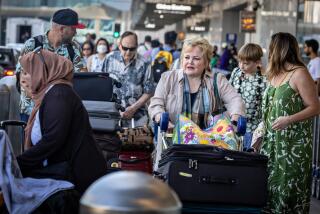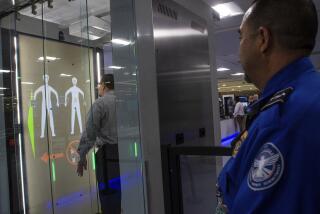Airport Screeners Fight Senate Bill
- Share via
They’ve rarely had a good word for each other. But with thousands of jobs at risk, the service workers’ union and a group of airport security companies now are fighting together in Congress to keep passenger screening in private hands.
The unlikely alliance underscores the large investments both sides have made in building a presence at U.S. airports.
These efforts could be wiped out by legislation being debated in the Senate to federalize the nation’s 20,000 screeners, part of a high-profile security bill prompted by the Sept. 11 terrorist attacks. A vote on the measure is expected early next week.
The debate comes down to this: Can the tedious job of screening airline passengers and their carry-on bags be performed better by federal employees, or by private security workers with strong federal supervision?
No one questions that the current system needs to change. The contractors, who now are hired by airlines, have long complained that competitive pressures force down wages to the point that they can’t find qualified employees.
The Bush administration and many Republican lawmakers favor tougher federal oversight of private contractors--a plan union activists find themselves strongly advocating.
“Ironically, we’re more in line with the Republicans on this one,” said Robert Masiola, a researcher with the Service Employees International Union, which represents about 2,000 airport screeners.
The sponsors of the pending Senate bill, Sens. John McCain (R-Ariz.) and Ernest Hollings (D-S.C.), insist that public confidence depends on seeing federal employees at screening stations, at least in the nation’s 142 largest airports.
In a letter to the Federal Aviation Administration last spring, Virginia-based contractor International Total Services pointed out that newspaper and ice-cream vendors in some airports earn more than their screeners. Turnover at some sites exceeded 500% a year, and positions were chronically understaffed, said Thomas Vaiden, president of aviation services for ITS.
“Until we are able to be competitive in the job market . . . we will have difficulty filling these positions,” he wrote.
ITS, which employs screeners at 112 U.S. airports, is one of four members of the newly formed Aviation Security Assn. The four, which have emerged as leaders in an industry that has undergone rapid consolidation in recent years, hold more than $600 million in annual contracts for airport security in the United States and Europe.
Other members of the association are:
* Securicor, a British company with about $330 million in aviation security contracts at 44 U.S. airports and 28 airports in Europe. The company bought Atlanta-based Argenbright last year, which gave the firm entree to U.S. airports.
* Securitas, a Swedishcompany with $50 million in contracts that operates in 33 U.S. airports and more than 50 in Europe. The company acquired Globe Security two years ago to enter the U.S. market.
* ICTS International, based in the Netherlands, holds about $155 million in airport contracts and works in 33 U.S. airports and 30 in Europe. The company bought Huntleigh Security two years ago to gain a presence in U.S. airports.
The group’s chief lobbyist, former FAA official Kenneth Quinn, said the same companies provide airport security in some of the world’s toughest venues, including Israel, Belfast, Brussels and Berlin. Airports in those locations often are cited as models for what U.S. airport security should look like.
“The only difference there is that you don’t have the airlines doing the contracting,” Quinn said. Wages are about 40% higher in Europe, and turnover--notoriously high in the U.S.--is about 10%, Quinn said.
“We need to move quickly to that European model, where the security companies are working directly for the government,” he said. “You could set a minimum standard for compensation in the contract, and it could be quite high. Then you could recruit the higher-caliber work force and keep them.”
Although unions representing pilots and flight attendants have argued for federalization of screeners, SEIU officials say private contractors would do a better job.
“Competition is fine if there are some norms,” said Jono Shaffer, who runs the union’s airport organizing campaign. “Here, the system made them compete to dangerous levels. It’s the nature of capitalism. Companies will do what the system tells them to do. In Europe, where the system is controlled by airports with tight federal regulation, that doesn’t happen.”
(BEGIN TEXT OF INFOBOX / INFOGRAPHIC)
Different Standards
Three foreign companies--Securitas, Securicor and ITCS--dominate the airport security business in the United States and Europe. However, security screeners receive much more training and higher pay in Europe.
Compensation
*--*
United States Europe Pay: $5.15-$6 an hour $9-$15 an hour Benefits: None Health, pension, vacation, holidays
*--*
Training Regulations
United States:
Content, duration and method of training are set by contractors and vary by airport and even terminal. Security screeners typically receive 12 hours of training.
Europe:
Government agencies set training goals, approve curriculum and conduct audits to ensure required training has been done. Security screeners typically receive 121 hours of training.
*
Source: General Accounting Office
More to Read
Sign up for Essential California
The most important California stories and recommendations in your inbox every morning.
You may occasionally receive promotional content from the Los Angeles Times.










